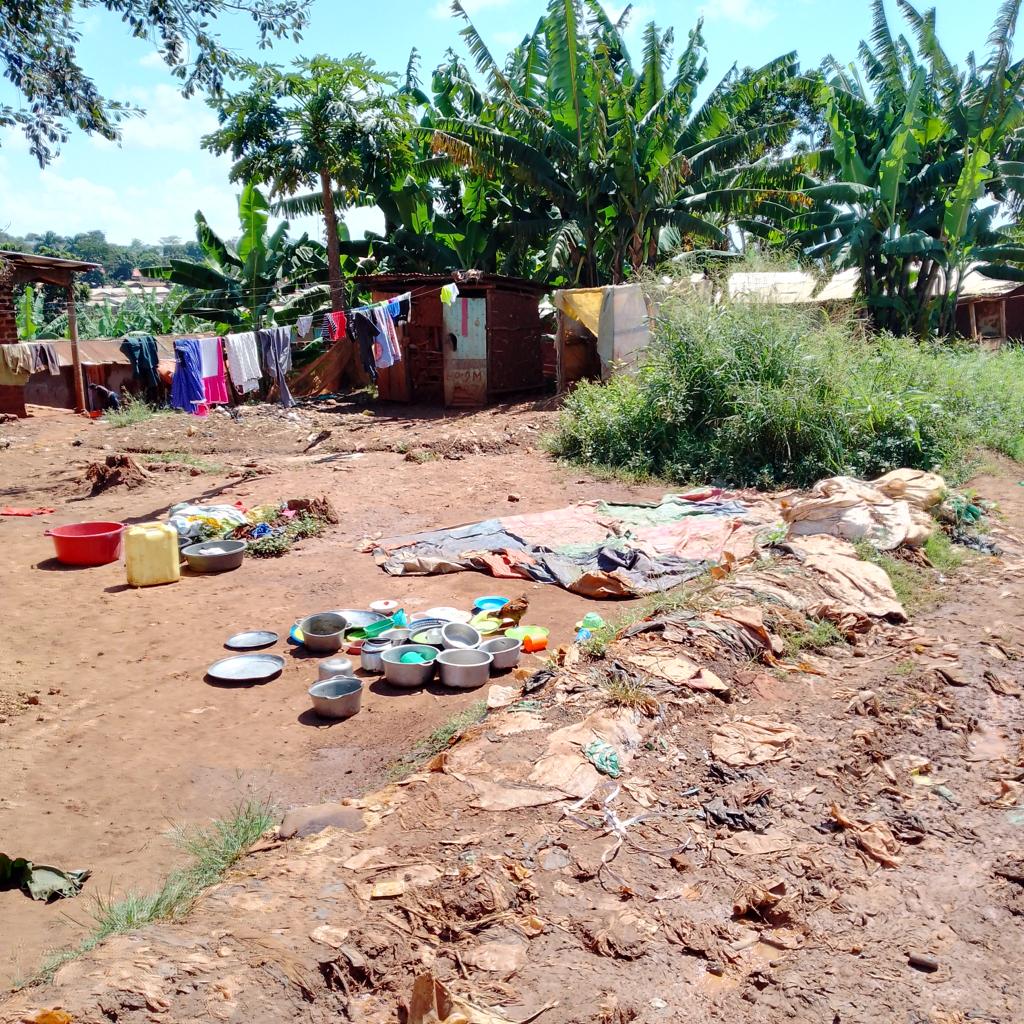Jinja: In as much as Jinja gained a city status, some areas in the city remain in a worrying state. Kikaramoja is situated about 3 kilometers from the city. The name kikaramoja is a reference to the Karimojong people of North Eastern Uganda. Many of them migrated here in the 70s in search for employment in the then vibrant industrial town that Jinja was. This community has lived here for over 45 years. There are no visible demarcations here, but everyone knows where their plot stops.
During the day, many residents head to Jinja city for work and return later in the evening while others operate on their small businesses that they have in the area like selling groceries, food from their small restaurants, charcoal, and operating mobile money shops. some go right ahead and collect heaps of empty plastic bottles that they sell off to recycling companies so that they can earn a living.
As I walked around the settlement, I saw a few brick structures as most of the houses in this area are temporary. Nayonga Caroline, age 35 has lived in this area since 2014. Her husband got a job in a nearby factory. She says that they were banned from constructing permanent houses.
“We came from Karamoja 7 years ago with my husband and children, my husband was a Boda Boda rider, but he disappeared and abandoned us. I don’t have a stable job. Sometimes, I wash for people clothes, and they pay me.
“Other times I brew alcohol, sell it and provide for myself and my children. The situation in this area is not good but we don’t have anywhere else to go,” Scovia Chandiru, a resident of Kikaramoja.
Life maybe hard in this area but some do not accept to be eaten up by their struggles as some residents spend their time sipping on a local brew called “malwa”. Some of these men and women are unemployed while others work as night watchmen.
However, the sanitation situation in this community is very poor. It goes without saying that people living in slums usually encounter numerous health problem. In this settlement, many residents do not have access to functioning latrines.
In areas where public facilities do exist, they are inadequate and overburdened with many people sharing one latrine in many instances. Some people often resort to open defecation which contributes to the spread of diarrhea and other killer diseases that put peoples’ lives at risk.
The population in this area is so high as most of the people in kikaramoja have from 5 to 8 children all living under one roof. Jackline Akello a mother of 8 children, she picks stuff from streets of Jinja. Her children dropped out of school. She ran away from her brutal in laws. She rents a single room which she is charged shs.30,000 per month. She earns little from washing clothes and dishes from a small restaurant.
“The steady rise in the population of the Karamojong and other migrants here have been attributed to lack or no knowledge about family planning methods and to make it worse, these people do not own huge land here. Kikaramoja is home to over 2000 residents with some running businesses in Jinja central market,” Mr Kanene Paul, health inspector, Walukuba Southern Division.
In addition to inadequate sanitation, this slum also faces challenges with its water supply. While some areas have standpipes, they are either no longer functioning, are in insufficient supply, or are unaffordable to individuals living in extreme poverty.
The lack of safe water sources combined with inadequate sanitation which could contribute to high rates of water borne diseases. This area also lacks proper drainage, water from outside bathrooms and rain combines with rubbish and collects in the stagnant pools. These pools can provide a ground for mosquitoes increasing the risk of malaria.
Mr. Paul Kanene, said they are working with enforcement officers to regulate sanitation in the community. He adds that they are also working with the office of the town clerk to rearrange the area since it was not properly planned. They are also planning to create awareness on the dangers of poor sanitation and that they are going to come up with strict laws on people who construct houses without latrines.
“We have planned to give health services to the residents of Kikaramoja of which we have a health centre, we are working with national water to see that the area can have access to clean water. There is also a deliberate effort to manage waste disposal, we have a health department that is working hard to see how they can help people of the Kikaramoja community,” Waniaye Khafuli Kenneth, Town Clerk, Jinja city south.
He adds that sometimes communities create these problems out of ignorance and irresponsible behavior that leads to problems of poor sanitation and that they are doing what they can as authorities to change that. Through educating the masses and carrying out continuous sensitization, they hope to change the situation in Kikaramoja slum.




